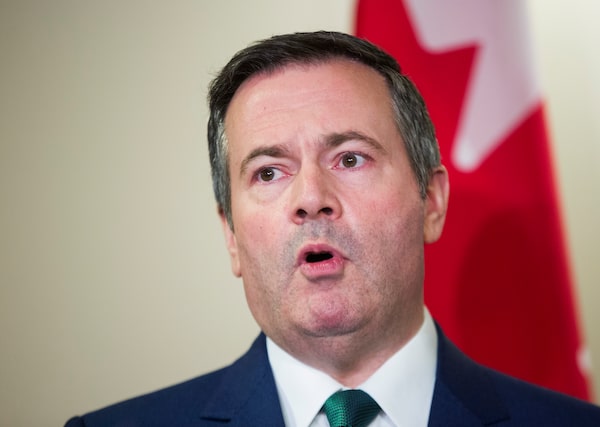
Alberta Premier Jason Kenney, seen here on Jan. 7, 2020, has built his political brand on battling with the federal government, including on matters of taxation.Todd Korol/The Canadian Press
“You can’t wring money from a stone,” Jason Kenney said this week of bankrupt oil and gas companies in Alberta that aren’t paying their municipal taxes – to the tune of tens of millions of dollars.
As the Premier highlighted, tax stress and tax revolt are political themes in Alberta this month.
The question now is whether the United Conservative Premier views all financially pinched taxpayers with the same concern. For those who carelessly categorize the province as politically homogeneous, the talk of tax resistance has come from all sides of the political spectrum.
Insolvent, stressed or reluctant energy-sector companies now owe rural municipalities $173-million in unpaid taxes. The flow of money that had long kept the relationship – sometimes a truce – between landowners, rural governments and the energy sector going is slowing to a trickle. Nerves are fraying. Late this week, The Canadian Press reported that a group representing landowners is asking farmers to fight back against unpaid debts by closing valves and cutting power to energy-company sites.
Oil prices dropped in 2014, and Alberta’s oil-focused economy has been unable to crawl out of that economic hole in the years since due to a rapidly shifting global energy landscape and a lack of pipeline access to accommodate increasing production.
Five years ago, farmers often wanted to have oil and gas wells on their land. The inconvenience or environmental concerns that came with drilling activity were offset by rent paid by oil companies. Likewise, municipal districts and counties welcomed pipelines or wells because of the boost to their property-tax revenues.
Now, the industry has contracted, and growth is uncertain. Both municipalities and farmers aren’t getting paid, in some cases, and pipelines and wells are increasingly viewed as liabilities rather than assets. For a small, rural municipality, the legal cost of chasing unpaid taxes is prohibitive.
This week, former provincial Liberal leader David Swann – long a respected voice of progressives in the province – announced that he will not pay his provincial taxes until oil and gas companies pay theirs. He’s asking others to join him. “Our government shouldn’t have one set of rules for their corporate friends, and another for the rest of us Albertans.”
Municipal Affairs Minister Kaycee Madu said on Twitter this week that his department is working to find a solution “that strikes the right balance to this ongoing, complex problem.” Mr. Madu blamed the decline in the energy sector on the policies of the previous NDP government, and the current federal government. Both he and the Premier say getting the energy sector firing on all cylinders again is key.
But the industry itself suggests there will be no full return to the halcyon days, saying municipal taxes are too high because the province’s assessment model significantly overvalues oil and gas assets.
Already, the UCP government has acted to help producers: Rural municipalities have been required to cut taxes for producers of shallow gas by 35 per cent. More in the way of tax relief could be in the works. But Al Kemmere, president of the Rural Municipalities of Alberta, told The Globe and Mail, “it feels like industry is getting more recognition for their plight than municipalities are.”
And as the economic stagnation continues, it’s not only rural governments feeling the pinch.
In Calgary, the city has implemented a series of tax-relief programs as short-term fixes to manage the multiyear municipal financial disaster that resulted from plummeting real estate values and high vacancy rates.
As a result of the dearth of money and tenants in Calgary’s downtown, other businesses in the city are increasingly picking up the tax slack. Double-digit annual increases are now the norm for non-residential property taxpayers outside the downtown core. A doubling of taxes year over year is far from unheard of.
The businesses are angry at the city, which is in turn critical of the province for cutting big-city funding so significantly in last year’s budget. The message from the UCP has been that the property-tax rates are city business, but Calgary’s spending has long been out of control, and Calgary Mayor Naheed Nenshi and his council have to learn to live within their means.
Kelly Doody, a digital marketing entrepreneur who has become a spokeswoman for frustrated Calgary businesses, organized a tax protest at City Hall last June. She says she’s fighting for the “survival" of the city’s entrepreneurs but wishes the debate wouldn’t devolve into mudslinging between partisan voices. “It’s so polarizing, you can’t win."
Mr. Kenney has built his political brand on battling with the federal government, including on matters of taxation. His “Fair Deal” panel for Alberta will examine whether a provincial revenue agency should collect provincial and federal taxes. And Mr. Kenney’s idea for a referendum on equalization in 2021 is a proxy for the anger over the flow of federal taxes east, and what many Albertans believe is indifference in other parts of the country to the province’s economic stress.
But increasingly, the Alberta Premier is going to have to be on guard for tax revolts within his own province, with some of the anger directed against his own government.
 Kelly Cryderman
Kelly Cryderman